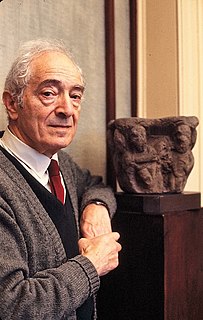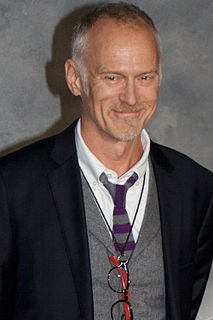A Quote by Muhammad Iqbal
The ultimate purpose of religious life is to make this evolution move in a direction far more important to the destiny of the ego than the moral health of the social fabric which forms his present environment.
Related Quotes
We started off with physical evolution and got our form. Then we somehow developed language, which meant cultural evolution could race so we could change our behavior really quickly instead of over hundreds and hundreds of years. And then comes moral evolution, which means we're not frightfully far along with people. And maybe we end up with a spiritual evolution, which is this connectedness with the rest of the life forms on the planet.
Each child is poisoned by the society through teaching him ambition. Ambition is a poison far more dangerous than any alcohol can ever be, far more dangerous than marijuana or LSD, because ambition destroys your whole life. It keeps you moving in a false direction. It keeps you imagining, desiring, dreaming, it keeps you wasting your life. Ambition means a subtle creation of the ego, and once the ego is created you are in the grip of darkness. And the whole social structure depends on ambition.
Evolution in the biosphere is therefore a necessarily irreversible process defining a direction in time; a direction which is the same as that enjoined by the law of increasing entropy, that is to say, the second law of thermodynamics. This is far more than a mere comparison: the second law is founded upon considerations identical to those which establish the irreversibility of evolution. Indeed, it is legitimate to view the irreversibility of evolution as an expression of the second law in the biosphere.
Style is, above all, a system of forms with a quality and a meaningful expression through which the personality of the artist andthe broad outlook of a group are visible,... communicating and fixing certain values of religious, social, and moral life through the emotional suggestiveness of forms. It is, besides, a common ground against which innovations and individuality of particular works may be measured.
That is again the same story played on a more subtle level. That's what the religious people have been doing down the ages - pious egoists they have been. They have made their ego even more decorated; it has taken the color of religion and holiness. Your ego is better than the ego of a saint; your ego is better, far better - because your ego is very gross, and the gross ego can be understood and dropped more easily than the subtle. The subtle ego goes on playing such games that it is very difficult. One will need absolute awareness to watch it.
There are all kinds of things evolving in filmmaking I'm not sure I'm comfortable with. A friend of mine just showed me an immersive 360 movie where you move from environment to environment and can look in any direction you want while you're experiencing it. Which is cool - but it kills directing, as far as I'm concerned.
Destiny ... a word which means more than we can find any definitions for. It is a word which can have no meaning in a mechanical universe: if that which is wound up must run down, what destiny is there in that? Destiny is not necessitarianism, and it is not caprice: it is something essentially meaningful. Each man has his destiny, though some men are undoubtedly "men of destiny" in a sense in which most men are not.
His conviction of having no purpose in life other than to act as a distillation of poison was part of the ego of an eighteen-year-old. He had resolved that his beautiful white hands would never be soiled or calloused. He wanted to be like a pennant, dependent on each gusting wind. The only thing that seemed valid to him was to live for the emotions--gratuitous and unstable, dying only to quicken again, dwindling and flaring without direction or purpose.
The ordinary man is living a very abnormal life, because his values are upside down. Money is more important than meditation; logic is more important than love; mind is more important than heart; power over others is more important than power over one's own being. Mundane things are more important than finding some treasures which death cannot destroy.



































